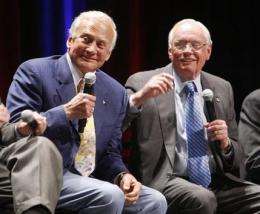Apollo astronauts Buzz Aldrin, left, and Neil Armstrong, right, participate in a panel discussion during the National Aviation Hall of Fame Spirit of Flight Award at National Museum of the USAF, Friday, July 17, 2009 in Dayton, Ohio. (AP Photo/David Kohl)
(AP) -- It was a reunion of reunions. Twelve Apollo astronauts reminisced, traded stories and poked fun at each other Friday night as the 40th anniversary of the first moon landing and moonwalk approached.
The astronauts, including first moonmen Neil Armstrong and Buzz Aldrin, attended the ceremony in which the National Aviation Hall of Fame presented the Apollo crews with the "Spirit of Flight" award for their courage and dedication.
The crowd of hundreds at the National Museum of the United States Air Force erupted in cheers when a video chronicling the space program replayed Armstrong's famous first words after stepping on the moon July 20, 1969: "One small step for man, one giant leap for mankind."
"It was spectacular," Armstrong recalled of gazing at the moon's surface as he took those first steps. "Any time you go to a place where everything you see is different than anything you've ever seen before in your life, it's unique and it's memorable. And that certainly was."
However, Armstrong said he and Aldrin had little time to savor the experience.
"We didn't rest hardly five seconds when we got a message from Mission Control, saying get on with the next item," Armstrong said.
Armstrong said he had been a backup on Apollo 8 and that when he wasn't needed was asked if he wanted to be on the third mission down the line - what turned out to be the fateful Apollo 11 mission. He said it was difficult to predict the exact mission of succeeding flights.
"We knew we had a chance at landing, but it was by no means certain," he said.
As they sat together on the stage, the astronauts joked and bantered with each other.
Astronaut Eugene Cernan, the last man to walk on the moon, also flew in the flight preceding Armstrong's. He joked that his job was paint a white line to the moon that Apollo 11 could follow.
"Everyone knew Neil could land on the moon, but we didn't have a lot of confidence Neil could find it," Cernan quipped.
"I've been listening to that for 40 years, and this is not the time to change my position," Armstrong shot back, drawing laughs from the crowd.
But the first lunar landing was a serious matter for the astronauts and those in mission control. When the designated landing zone proved to be too rocky, Armstrong had to burn fuel from a diminishing supply to find a suitable place to touch down.
"I can't say it was panic, but it was a lot of attention to detail in mission control," said Charles Duke, who was at mission control at the time. "The fuel level is going down, down, down, and things are getting real tense." When there were only 30 seconds of fuel left, "it got dead silent."
Aldrin still has the felt-tipped pen he used as a makeshift switch needed to fire up the engines that lifted him and Armstrong off the moon and started their safe return to Earth.
"The pen and the circuit breaker (switch) are in my possession because we do get a few memorabilia to kind of symbolize things that happened," Aldrin told reporters earlier Friday.
Aldrin, 79, spoke at a bookstore in the Dayton suburb of Beavercreek, where he autographed copies of his new book: "Magnificent Desolation: The Long Journey Home from the Moon." He and 11 other Apollo astronauts were to be honored Friday night at the National Aviation Hall of Fame in Dayton.
As stunningly successful as the first trip to the moon was in July 1969, a few things didn't quite go as planned, Aldrin said.
For example, there were some puzzling computer overloads, but they proved to be minor and had no effect on the landing, he said.
Following the moonwalk and the astronauts' return to the lunar module on the moon's surface, Aldrin discovered that the switch to the circuit breaker that sent electricity to the engine that would lift them off had broken off.
"If you couldn't push it in, then maybe we had a problem," Aldrin recalled.
Aldrin pulled the pen from his shoulder pocket, inserted it into the small hole where the switch should have been, and the circuit breaker held. The engines fired, and the two astronauts were on their way back.
Aldrin told the bookstore crowd that the moon is a desolate place, but magnificent in the sense that it came to symbolize what humanity is capable of achieving.
"The climax maybe of my life was landing on the moon with Neil," Aldrin said. "And landing is more important than walking around outside, despite what everybody wants to think. Landing opens the door to do everything else that had never been done before."
©2009 The Associated Press. All rights reserved. This material may not be published, broadcast, rewritten or redistributed.





















